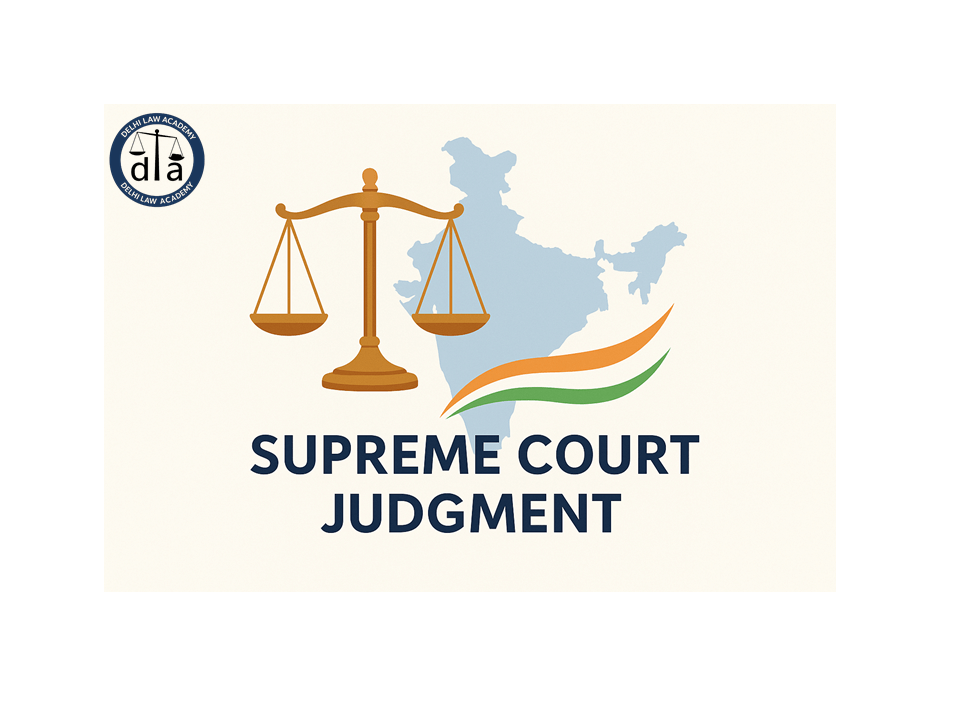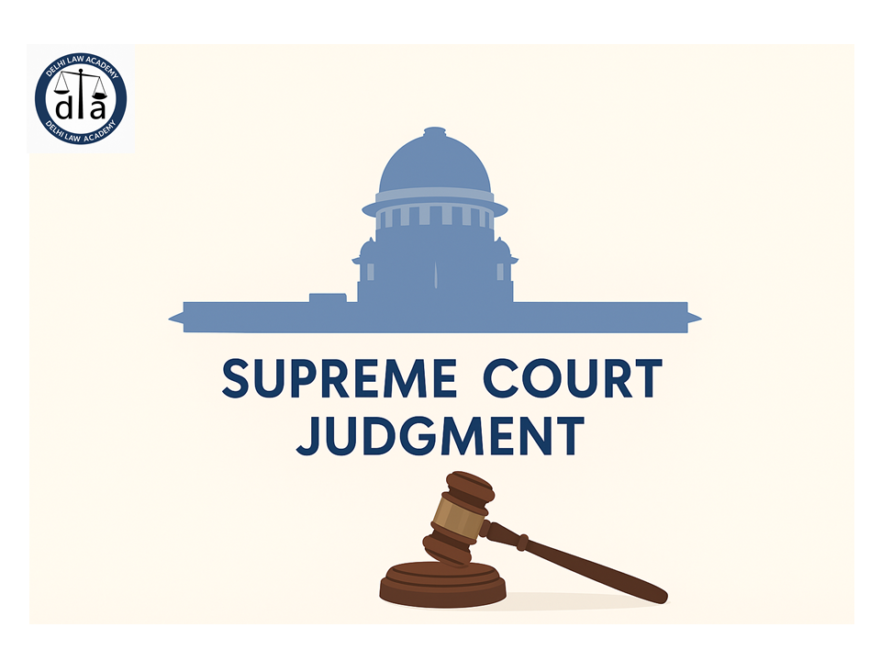
Supreme Court Judgment: Builder Compensation at 18% Interest
Delhi Law Academy Jaipur presents below for aspirants of Rajasthan Judicial Service (RJS), DJS, PCS(J) and other Judicial Services throughout India the most recent judgment of the Supreme Court of India, delivered just last week, on 24th September 2025, declaring that the builder who failed to deliver possession of the booked house to the buyer cannot be permitted to escape with a nominal liability of 9% interest; instead he should pay interest at 18% per annum which was the rate he charged from the buyer for default in payment of instalments by the latter.
Presented below: Summarized version [by Delhi Law Academy Jaipur] of the Supreme Court Judgment in the case of Rajnesh Sharma v. Business Park Town Planners delivered by a two-judge Bench comprising of Dipankar Datta and Augustine George Masih JJ. on 24 September, 2025. [Original language of the judgment has not been disturbed or replaced]
Case Title
Rajnesh Sharma v. Business Park Town Planners Ltd. [2025 INSC 1149]
Judgment
1. This appeal assails an order dated 13th January, 2023, passed by the National Consumer Disputes Redressal Commission, New Delhi disposing of a consumer complaint lodged before it by the appellant.
Facts in Brief
2. Facts in brief, necessary for the disposal of the present appeal, are as follows:
- a. On 10th March, 2006, the appellant booked a plot in a project of the respondent named Park Land for a total sale consideration of Rs. 36,03,692/- (basic price – Rs. 30,87,000/-). As advance/registration charges, Rs. 7,86,218/- was paid on the same day.
- b. On 11th December, 2007, a plot buyer agreement was executed between the parties.
- c. As per clause 22 of the AGREEMENT, the possession of the plot was to be handed over within 24 months of sanction of service plans of the entire colony. Furthermore, clause 12 provided that time is of the essence, and in case of default by the buyer, late payment charges at 18% p.a. on the due amount, compounded at the time of every succeeding instalment or three months, whichever is earlier, would be levied by the respondent.
- d. By April, 2011, the appellant had paid a sum of Rs. 28,79,065/-.
- g. Aggrieved by the respondent’s inaction in allotting the plot, the appellant terminated the AGREEMENT with the respondent vide letter dated 27th March, 2017.
- i. Ultimately, in April 2018, the appellant lodged the consumer complaint before the NCDRC referred to in the opening paragraph.
- j. After the lodging of the complaint, the respondent offered the possession of the plot on 8th May, 2018, subject to payment of a further amount of Rs. 7,60,900.33/-.
- k. Vide the impugned order, the consumer complaint was disposed of with directions to the respondent to refund the entire principal amount of Rs. 43,13,212/- along with simple interest @ 9% p.a. from the date of each payment till the date of refund. Additionally, Rs. 25,000/- was awarded towards litigation costs to the appellant.
- l. The said order is under challenge before this Court in this appeal at the instance of the partly successful complainant.
Key Observations
11. Suffice it to say, there is no principle of law that interest in default charged by the builder can never be granted to the buyer.
14. As per clause 22 of the AGREEMENT, possession of the plot was to be handed over within 24 months of sanction of service plans of the entire colony. Admittedly, no offer for possession was made until the year 2018. The conduct of the respondent in the interregnum is also worthy of a discussion.
16. Clause 7 provides that the location of the plot may be changed if the government or any statutory authority requires a change in the existing layout plan. During arguments, we enquired of Mr. Nayyar for the respondent to show the basis for invoking clause 7 of the AGREEMENT, i.e., to show us that the layout plan was sought to be changed by the government or statutory authority. In answer thereto, it was submitted that the alternative allotment was made in the year 2011; however, till 2018, the appellant raised no demur as regards the same. The answer is neither here nor there. Whether or not the appellant raised a demur is not relevant for validation of the respondent’s conduct. Also, the basis for offering such alternative allotment has not been disclosed in the written submissions filed by the respondent.
17. Be that as it may, the possession of the alternative plot (allotted in the year 2011) was offered only in the year 2018.
18. Having noted thus, we agree with Mr. Nayyar that before compensation can be granted by the NCDRC, actual loss must be proved to have been suffered by the consumer. The objective of granting compensation cannot be altered such that it amounts to a windfall gain to the other party. Proof of actual loss would require evidence to be tendered, for, it is a guiding lamp for grant of compensation. Be that as it may, in this case, we are not deciding the actual loss suffered by the appellant.
We are only concerned with deciding the rate of interest to be awarded to the appellant on the principal amount paid by him to the respondent.
Final Judgment
19. Keeping in mind the overall conduct of the respondent: the delay caused by it in offering the plot, the fact that the respondent charged the appellant delay compensation @ 18% p.a. on the due amount, and the long wait that the appellant had to endure over a period of a decade, causing harassment and anxiety, which are writ large, we find that this is an appropriate case where refund of the principal amount with interest @ 9% p.a., as awarded by the NCDRC, will not serve the ends of justice.
20. In view of the conduct of the respondent, it cannot be permitted to escape with a nominal liability for its default, while it charged interest @ 18% on default committed by the appellant. Although, the rate of interest charged by the builder cannot be granted to the buyer as a rule of thumb, however, in the present case, equity and fairness demands that the respondent be put to the same rigours for charging 18% interest and face consequences similar to those imposed on the appellant for default committed by him. If we hold otherwise, we will be perpetuating a manifestly wrong bargain.
21. We, therefore, substitute the rate of interest awarded by the NCDRC and increase it from 9% to 18% per annum, while keeping the other terms intact.
❓ Frequently Asked Questions
The Supreme Court ruled that the builder, who failed to deliver possession of the property on time, cannot escape with a nominal liability of 9% interest. Instead, the Court held that interest should be paid at 18% per annum, the same rate that the builder had charged the buyer for delays in payment of installments.
This judgment is significant because it highlights the principle of fairness and equity in consumer disputes. It stresses that builders must face the same consequences for delays as consumers do. Judiciary aspirants can use this case to understand how the Supreme Court applies equitable principles in real-world disputes.
The National Consumer Disputes Redressal Commission (NCDRC) had awarded 9% interest, but the Supreme Court found this inadequate given the builder’s conduct. The Court increased the rate to 18%, emphasizing that consumer justice requires balancing fairness between builder and buyer.
The Court held that since the builder had contractually charged 18% interest for buyer delays, it would be unjust to impose only 9% for the builder’s own default. Therefore, to maintain fairness and avoid a “manifestly wrong bargain,” the rate was raised to 18% per annum.
This case is a strong illustration of consumer protection, contract law, and equitable principles. It can be quoted in mains answers and interviews for Rajasthan Judicial Service (RJS), DJS, and PCS(J) exams to demonstrate awareness of recent Supreme Court jurisprudence.
The Court reiterated that compensation should not amount to a windfall gain and should ideally be based on proof of actual loss. However, in this case, it focused only on the rate of interest and used equitable considerations to ensure justice, without going into detailed proof of loss.
📚 Further Reading for Law Aspirants
Explore more useful resources from Delhi Law Academy to strengthen your preparation:
Contact us
📍 Delhi Law Academy – Jaipur Branch
6C, Tower 2, Coaching Hub, Pratap Nagar, Jaipur – 302033
📞 Phone:
+91 9911916552
+91 8447285606
✉️ Email:
contactus@delhilawacademy.com

